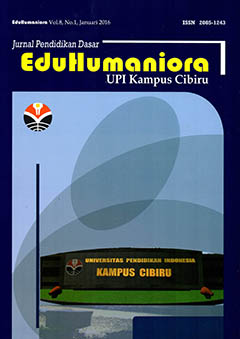LEARNING FUN DURING THE COVID-19 PANDEMIC: PHENOMENOLOGICAL RESEARCH BASED ON THE PERSPECTIVE OF ELEMENTARY SCHOOL STUDENTSPEMBELAJARAN
Abstract
This study aims to dig up information about fun learning during the Covid-19 pandemic. This study is focused on analyzing the perspectives of high school elementary school students regarding fun learning during the Covid-19 pandemic. The method used is qualitative with a phenomenological design, data collected from a qualitative approach by conducting interviews and distributing questionnaires. The participants in this study were 19 fourth, fifth, and sixth grade elementary school students. The results of data collection were analyzed to form several themes. The results of the study show the importance of the skills and personality of the teacher in teaching because it greatly influences students' understanding and passion for learning. The nature and attitude shown by the teacher to students greatly influences learning, how the teacher conveys the material, chooses learning methods, and chooses learning media can attract students to enjoy learning. The role of parents is also one of the supporting factors for the creation of fun learning during the pandemic. It is very important to collaborate between teachers and parents to achieve learning goals so that they can create fun learning during the Covid-19 pandemic.
Keywords
Full Text:
PDFReferences
Agyeiwaah, E., Baiden, F. B., Gamor, E., and Hsu, F. C. (2022). Determining the attributes that influence students’ online learning satisfaction during COVID-19 pandemic. Journal of Hospitality, Leisure, Sport and Tourism Education, 30, 100364.
Ahmed, S., Shehata, M., and Hassanien, M. (2020). Emerging faculty needs for enhancing student engagement on a virtual platform. MedEdPublish, 9(75), 75.
Bao, W. (2020). COVID‐19 and online teaching in higher education: A case study of Peking University. Human Behavior and Emerging Technologies, 2(2), 113–115.
Berliana, A. U., Mailizar, M., Faiza, F., and Leonard, L. (2021). Pengembangan media pembelajaran berbasis android melalui model pembelajaran PAIKEM (Pembelajaran Aktif, Inovatif, Kreatif, dan Menyenangkan). Journal of Instructional Development Research, 2(2), 57-68.
Bozkurt, A., and Sharma, R. C. (2020). Emergency remote teaching in a time of global crisis due to corona virus pandemic. Asian journal of distance education, 15(1), i-vi.
Chen, M. M., and Cheng, B. H. (2020). Understanding taiwanese women’s decisional experiences regarding prenatal screening procedures and diagnostics: A phenomenological study. Asian Nursing Research, 14(4), 231–240.
Corley, A., Hammond, N. E., and Fraser, J. F. (2010). The experiences of health care workers employed in an Australian intensive care unit during the H1N1 Influenza pandemic of 2009: A phenomenological study. International Journal of Nursing Studies, 47(5), 577–585.
Dewi, W. A. F. (2020). Dampak covid-19 terhadap implementasi pembelajaran daring di sekolah dasar. Edukatif : Jurnal Ilmu Pendidikan, 2(1), 55-61.
Fitrah, M., and Ruslan, R. (2020). Eksplorasi sistem pelaksanaan evaluasi pembelajaran di sekolah pada masa pandemi covid-19 di bima. Jurnal Basicedu, 5(1), 178–187.
Goldschmidt, K. (2020). The covid-19 pandemic: Technology use to support the wellbeing of children. Journal of Pediatric Nursing, 53, 88–90.
Hanafy, M. S. (2014). Konsep belajar dan pembelajaran. Lentera Pendidikan : Jurnal Ilmu Tarbiyah Dan Keguruan, 17(1), 66–79.
Harmanto, B. (2016). Merancang pembelajaran menyenangkan bagi generasi digital. Jurnal Pendidikan Islam, 9(1), 8.
Hong, R.-M., and Guo, S.-E. (2015). Use of arts among single mothers in taiwan: a hermeneutic phenomenological research study. Journal of Womens Health Care, 4(1), 1–7.
Husky, M. M., Kovess-Masfety, V., and Swendsen, J. D. (2020). Stress and anxiety among university students in France during Covid-19 mandatory confinement. Comprehensive Psychiatry, 102, 152191.
Kozma, R. B. (2011). ICT, education transformation, and economic development: An analysis of the US National Educational Technology Plan. E-Learning and Digital Media, 8(2), 106-120.
Mok, K. H., Xiong, W., and Bin Aedy Rahman, H. N. (2021). Covid-19 pandemic’s disruption on university teaching and learning and competence cultivation: Student evaluation of online learning experiences in Hong Kong. International Journal of Chinese Education, 10(1), 1–20.
Mulyati, M. (2019). Menciptakan pembelajaran menyenangkan dalam menumbuhkan peminatan anak usia dini terhadap pelajaran. Alim | Journal of Islamic Education, 1(2), 277–294.
Noor, S., and Shaoun, S. P. (2021). Online education and community participation in bangladesh: challenges and opportunities to ensure inclusive learning during covid-19 school closure. Indian Journal of Public Administration, 67(4), 620–638.
Oktaviani, T., and Dewi, E. R. S. (2019). Penerapan pembelajaran aktif dengan metode permainan bingo untuk meningkatkan hasil belajar matematika. Mimbar Ilmu, 24(1), 47-52.
Park, H. J., and Bae, J. H. (2014). Study and research of gamification design. International Journal of Software Engineering and Its Applications, 8(8), 19–28.
Purwono, P., Setyawati, E., Nisa, K., and Wulandari, A. (2021). Strategi gamifikasi sebagai peningkatan motivasi kuliah pemrograman website pada masa pandemi covid19. JOINTECS (Journal of Information Technology and Computer Science), 6(3), 129-135.
Putra, P., Liriwati, F. Y., Tahrim, T., Syafrudin, S., and Aslan, A. (2020). The students learning from home experiences during covid-19 school closures policy in indonesia. Jurnal Iqra’ : Kajian Ilmu Pendidikan, 5(2), 30–42.
Qiftiyah, M., and Calista, W. (2021). Shadow teacher for special needs students: case study class vi taman muda ibu pawiyatan yogyakarta. EduHumaniora | Jurnal Pendidikan Dasar Kampus Cibiru, 13(1), 26–35.
Rahiem, M. D. H. (2020). Technological barriers and challenges in the use of ict during the covid-19 emergency remote learning. Universal Journal of Educational Research, 8(11B), 6124–6133.
Rahiem, M. D. H. (2021). Remaining motivated despite the limitations: University students’ learning propensity during the covid-19 pandemic. Children and Youth Services Review, 120(11B), 105802.
Rahmawati, E. (2021). Konsep pembelajaran menyenangkan bagi siswa kelas bawah tingkat sekolah dasar. RESLAJ : Religion Education Social Laa Roiba Journal, 4(1), 171–178.
Rasmussen, B., Hutchinson, A., Lowe, G., Wynter, K., Redley, B., Holton, S., Manias, E., Phillips, N., McDonall, J., McTier, L., and Kerr, D. (2022). The impact of covid-19 on psychosocial well-being and learning for australian nursing and midwifery undergraduate students: A cross-sectional survey. Nurse Education in Practice, 58(5), 103275.
Selvanathan, M., Hussin, N. A. M., and Azazi, N. A. N. (2020). Students learning experiences during covid-19: Work from home period in Malaysian Higher Learning Institutions. Teaching Public Administration, 20(10), 1–10.
Setiyawan, M., Winarno, W. W., and Sunyoto, A. (2019). Implementasi gamification pada aplikasi perkuliahan mahasiswa dengan metode feature driven development (Studi Kasus: AMIK Cipta Darma Surakarta). Jurnal Ilmiah IT CIDA, 5(1), 16-30.
Shearer, R. L., Aldemir, T., Hitchcock, J., Resig, J., Driver, J., and Kohler, M. (2020). What students want: A vision of a future online learning experience grounded in distance education theory. American Journal of Distance Education, 34(1), 36–52.
Son, C., Hegde, S., Smith, A., Wang, X., and Sasangohar, F. (2020). Effects of covid-19 on college students’ mental health in the United States: Interview survey study. Journal of Medical Internet Research, 22(9), e21279.
Trinova, Z. (2012). Hakikat belajar dan bermain menyenangkan bagi peserta didik. Al-Ta lim Journal, 19(3), 209–215.
Wijanarko, Y. (2017). Model pembelajaran make a match untuk pembelajaran IPA yang menyenangkan. Taman Cendekia: Jurnal Pendidikan Ke-SD-an, 1(1), 52–59.
DOI: https://doi.org/10.17509/eh.v15i2.47393
Refbacks
- There are currently no refbacks.
Copyright (c) 2023 EduHumaniora | Jurnal Pendidikan Dasar Kampus Cibiru
EduHumaniora: Jurnal Pendidikan Dasar
Published in collaboration Program Studi PGSD UPI Kampus Cibiru
and
HDPGSDI
This work is licensed under a Creative Commons Attribution-ShareAlike 4.0 International License.















